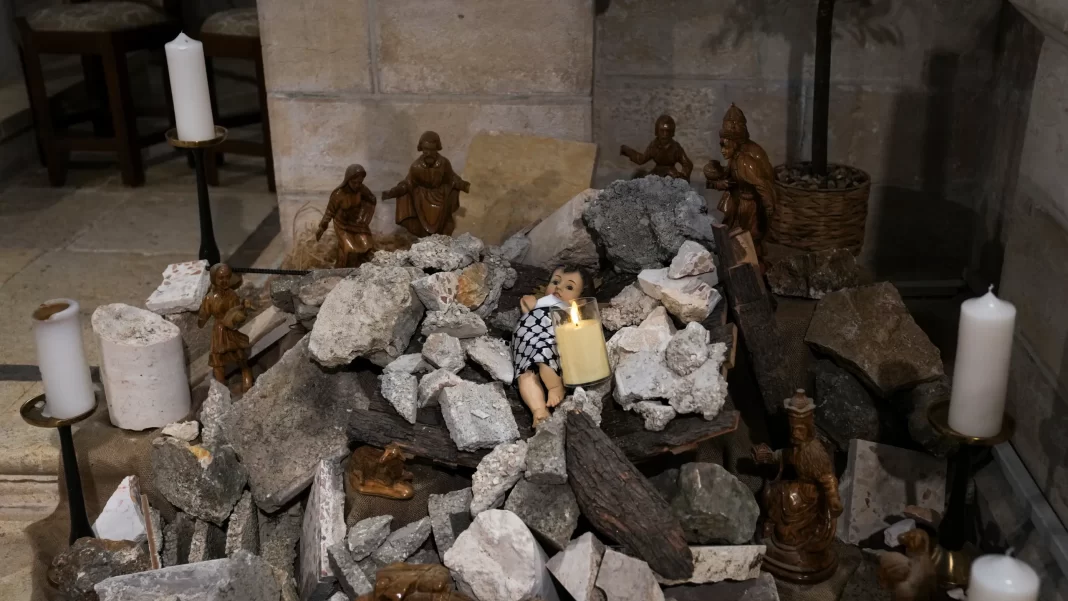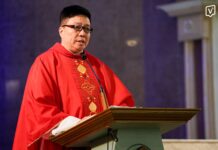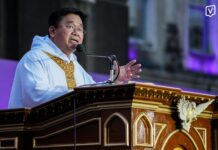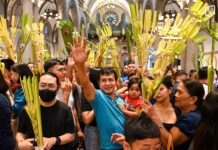IN the birthplace of Jesus Christ, locals have pared down their celebration of Christmas, a sobering reminder of how the war between Israel and the Palestinian militant group Hamas has upended life there.
Public celebrations in Bethlehem are canceled. The iconic Christmas tree that is annually lit at Manger Square is nowhere to be found. And the Evangelical Lutheran Christmas Church features an infant Jesus born in the rubble to depict the humanitarian crisis unfolding in Gaza.
“Due to the ongoing war, the local Christians of Bethlehem wanted to show their solidarity to all who were affected by the war, so the festivities were suspended,” Bro. Mark Vertido, O.F.M., a Franciscan friar studying in Jerusalem, said in an interview with the Varsitarian.
“It is a painful experience this year, not only because of the war but also because the people of Bethlehem are accustomed to welcoming thousands of pilgrims during these months, but pilgrimages are suspended for the moment,” he added.
Church leaders have decided to celebrate Christmas with “sobriety” to commiserate with the “many children, women, the elderly, the people who were martyred in this crazy war.”
“We have never seen Bethlehem like this, not even during the time of Covid,” Fr. Ibrahim Faltas, vicar of the Franciscan-run Custody of the Holy Land in Jerusalem, told the wire news agency Reuters. “The town is empty, sad.”
More than 20,000 Palestinians have died since the war erupted on Oct. 7, according to the Gaza Health Ministry, the largest death toll in any Arab conflict since the 1980s.
Peace has been elusive so far. The United Nations (UN) Security Council on Friday, Dec. 22, adopted a resolution simply urging more aid to safely enter Gaza. Another resolution calling for a permanent ceasefire failed to pass after the United States (US) used its veto power.
“Hamas has no desire to see a durable peace, to see a two-state solution,” US Ambassador Robert Wood explained on Dec. 9 before the voting. “For that reason, while the US strongly supports a durable peace, in which both Israelis and Palestinians can live in peace and security, we do not support calls for an immediate ceasefire.”
For Vertido, there is a strong sense of ecumenism between the Vatican, the Latin Patriarchate of Jerusalem, and the Custody of the Holy Land that has been advocating for peace in the besieged country.
“For the people, it is very comforting to know that there is a Church which listens to their cry and intercedes their voices first to God and then to the world,” he said. “Dialogue has always been beneficial to all, especially in pursuing peace and justice.”
In his Christmas message, Cardinal Pierbattista Pizzaballa, the patriarch of Jerusalem, reminded the faithful that the birth of Jesus is an invitation to seek peace and reconciliation amid violence and hatred.
“This is the divine message of hope and peace that Christ’s Nativity inspires within us, even in the midst of suffering,” he said in a statement on Thursday, Dec. 21. “For Christ himself was born and lived amid great suffering. Indeed, he suffered for our sake, even unto death upon a cross, in order that the light of hope would shine into the world, overcoming the darkness.”
Despite the muted celebration, the Franciscan said Christmas would be celebrated.
“Of course, Christmas cannot be canceled, though it is celebrated in another form, that is, a constant prayer for peace,” Vertido, who is pursuing undergraduate studies in sacred theology at the Studium Theologicum Jerosolymitanum in Jerusalem, said.














